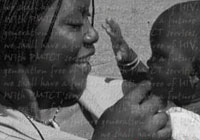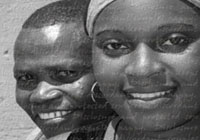 The aim of the campaign, also known as
The aim of the campaign, also known as
the “faces” campaign, was to remove the
stigma associated with HIV by showing
pictures together with testimonies of
Ugandans who live positively with HIV.
Credits: UNAIDS/J.EwenHIV has often been associated with behaviours that may be considered socially or morally unacceptable by many people such as sex work, sex outside marriage or with multiple partners, sex between men and injecting drugs. This single fact, fueled by high levels of ignorance, denial, fear and intolerance, has widely stigmatized HIV infection.
In order to reverse the preconceptions about people living with HIV and at the same time raise awareness around different AIDS-related issues, UNAIDS in partnership with the Uganda Red Cross, developed a campaign entitled “The Truth is Not Written on Your Face”.
The aim of the campaign, also known as the “faces” campaign, was to remove the stigma associated with HIV by showing pictures together with testimonies of Ugandans who live positively with HIV. At the same time, the campaign highlighted that the HIV status of a person it is not shown on their face. As a result, it reinforced the need for effective and efficient prevention tools and behaviours, such as limiting the number of sexual partners and the consistent use of condoms, to prevent the transmission of HIV.
“Despite a long history with the epidemic, there is often still an assumption in Uganda that it is ‘someone else’ who has HIV, or there are strong moral undertones which suggest it must be sex workers, etc. who are affected by it”, said Malayah Harper, UNAIDS Country Coordinator. This has lead to complacency and much of the positive behaviour change from the 1990s is being eroded. “The ‘faces’ campaign proved these assumptions wrong while at the same time highlighting the importance of preventing HIV”, she added.
 Experience teaches that a strong movement
Experience teaches that a strong movement
of people living with HIV that affords mutual
support and a voice at local and national
levels is particularly effective in tackling
stigma. Credits: UNAIDS/J.EwenStigma and discrimination are violations of human rights and undermine public health efforts to tackle the HIV epidemic. People living with HIV are frequently subject to discrimination. Many have been thrown out of jobs and homes, rejected by family and friends, and some have been killed because of their HIV status.
Together, stigma and discrimination constitute one of the greatest barriers to dealing effectively with the epidemic. They can discourage governments from acknowledging or taking timely action against AIDS. They can deter individuals from finding out about their HIV status and they inhibit those who know they are infected from sharing their diagnosis and from seeking treatment and care for themselves.
Experience teaches that a strong movement of people living with HIV that affords mutual support and a voice at local and national levels is particularly effective in tackling stigma.





